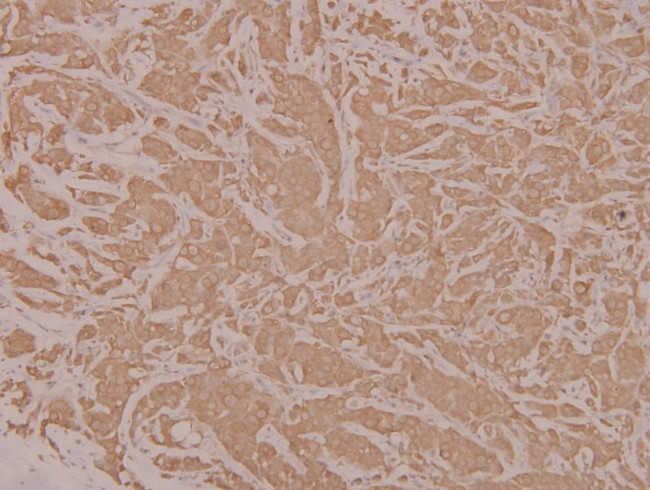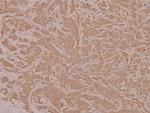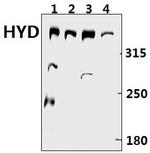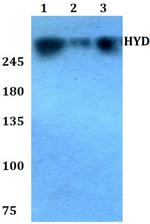Search Thermo Fisher Scientific
Product Details
PA5-36085
Species Reactivity
Host/Isotype
Class
Type
Immunogen
Conjugate
Form
Concentration
Purification
Storage buffer
Contains
Storage conditions
Shipping conditions
RRID
Product Specific Information
This antibody detects endogenous protein at a molecular weight of 309 kDa.
Purity is >95% by SDS-PAGE.
Target Information
EDD (for E3 identified by Differential Display) is a progestin-regulated gene that was isolated from T-47D human breast cancer cells. Based on sequence homology, EDD appears to be a human homolog of the Drosophila hyperplastic discs (hyd) gene, a tumor suppressor gene that is required for control of imaginal disc growth. EDD contains a HECT domain in the carboxy terminus. HECT domain-containing proteins function as ubiquitin-protein ligases, or E3 enzymes. EDD has been shown to bind to ubiquitin, and like other HECT family proteins, may function as an E3 ubiquitin-protein ligase.
For Research Use Only. Not for use in diagnostic procedures. Not for resale without express authorization.
References (0)
Bioinformatics
Protein Aliases: CH D1S3362; E3 identified by differential display; E3 ubiquitin-protein ligase UBR5; E3 ubiquitin-protein ligase, HECT domain-containing 1; ECGF1; EDG-1; EDG1; extraembryonic development; hHYD; Hyperplastic discs protein homolog; Progestin-induced protein; S1P1; S1PR1
Gene Aliases: DD5; EDD; EDD1; HYD; KIAA0896; Rat100; UBR5
UniProt ID: (Human) O95071, (Mouse) Q80TP3
Entrez Gene ID: (Human) 51366, (Rat) 117060, (Mouse) 70790

Performance Guarantee
If an Invitrogen™ antibody doesn't perform as described on our website or datasheet,we'll replace the product at no cost to you, or provide you with a credit for a future purchase.*
Learn more
We're here to help
Get expert recommendations for common problems or connect directly with an on staff expert for technical assistance related to applications, equipment and general product use.
Contact tech support




